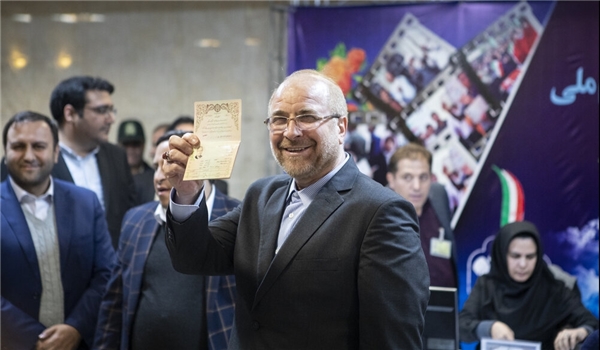Iran Election: Principlists Win All 30 Parliament Seats in Tehran
Official reports on the final results of the 11th parliamentary elections in Iran showed that the Principlist camp's 30 member list of candidates, named 'Unity of the Revolutionary Forces Coalition' also known as 'The Glorious Iran', has earned a crushing victory over their reformist, moderate and independent rivals in Tehran province.

Former mayor of Tehran Mohammad Baqer Qalibaf is on the top of the list of most-voted candidates in the capital with 1,265,287 votes.
The Principlist camp’s 30-member list of candidates has won all the seats in the Friday election as follows:
Mohammad Baqer Qalibaf 1,265,287
Seyed Mostafa Aqa Mirsalim 892,318
Morteza Aqa Tehrani 868,025
Elyas Naderan 841,956
Seyed Mohsen Dehnavi 829,292
Seyed Mohammad Nabavian 821,203
Ehsan Khandouzi 801,696
Eqbal Shakeri 795,211
Abolfazl Amouyee 792,964
Bijan Nobaveh Vatan 792,565
Mojtaba Tavangar 789,913
Fatemeh Rahbar 787,485
Mohsen Pirhadi 785,450
Rouhollah Izadkhah 784,456
Ahmad Naderi 783,545
Abdolhossein Rouhol Amini 779,479
Seyed Nezameddin Moussavi 778,618
Zohreh Elahian 773,263
Malek Shariati 768,139
Mehdi Sharifian 760,016
Seyed Reza Taqavi 753,307
Somayyeh Rafiyee 742,975
Seyed Ali Yazdikhah 742,394
Ali Khezrian 740,033
Reza Taqipour 728,238
Fatemeh Qasempour 726,007
Mojtaba Rezakhah 723,729
Zohreh Sadat Lajevardi 714,931
Gholam Hossein Rezvani 711,608
Ezzatollah Akbari Talarposhti 642,214
Polling stations in Iran closed for parliamentary elections and Assembly of Experts midterm voting last midnight after large public turnout in the final hours made Interior Ministry officials extend the deadline three times on Friday.
Due to a high turnout, the Interior Ministry extended the voting deadline for 6 hours. Voting started at 8am local time (0430GMT) and was to end at 18:00 local time (1430GMT).
Ballot counting started in less than an hour after all voters left stations and Interior Ministry and Guardian Council election supervisory boards and monitors did the needed checks and controls.
Initial results in small cities and towns had appeared Saturday morning.
Unofficial results of the elections released on Saturday said nearly 1,900,000 people have participated in the Friday elections in Tehran.
Tens of millions of Iranians headed to the polls to elect 290 members for the Majlis (the parliament) and 7 members of the Assembly of Experts in its midterm elections on Friday morning.
Candidates from across the political isle were vying for 30 parliamentary and 3 Experts Assembly seats in the capital.
Long queues of people were reported in different cities and towns of Iran, including the capital, Tehran.
Supreme Leader of the Islamic Revolution Ayatollah Seyed Ali Khamenei, President Hassan Rouhani, Parliament Speaker Ali Larijani, Judiciary Chief Ebrahim Rayeesi and other high-ranking Iranian officials cast their votes in the early hours of Friday morning, calling for people’s mass-participation.
Iranian Interior Minister Abdolreza Rahmani Fazli had announced last Saturday that 54,611 polling stations across the country would open on Friday in 208 electoral regions, saying the ballot papers have been designed with 10 security indices to prevent any fraud.
According to the interior minister, there are 57,918,159 eligible voters in the parliamentary elections on Friday, including around 3 million people eligible to vote for the first time.
Law Enforcement Police forces and (Basij) voluntary forces have been entrusted with establishment of security in different cities and towns during elections hours.
Last Tuesday, Ayatollah Khamenei called on people to go to the polls.
“Elections are a source for strengthening the country. Look at how US propaganda seeks to separate the people from the Islamic system. They create think tanks to plot this. They seek to distance the Iranian youth from the Islamic system, but they won’t succeed,” Ayatollah Khamenei said, addressing a large number of Iranian people from East Azarbaijan province in Tehran.
“Enemies and friends are watching. Enemies want to see the result of these economic problems, the Westerners’ deceit in their promises to us, and the US pressures on the people. Our friends watch worriedly, but we always tell them not to worry. The Iranian nation knows what it’s doing,” he said.
“Taking part in the elections nullifies many of the vicious plots of the US and the Zionist regime against Iran. These elections repel the schemes and ploys of the enemies of Iran,” Ayatollah Khamenei added.
“Iran should become stronger; this frustrates the enemy. One manifestation of strength is having a strong Majlis. The more participation there is in the election, the stronger the Majlis will be. This is one factor for strengthening the Majlis,” he continued.
Meantime, the Iranian interior minister said last Saturday that a runoff vote for the parliamentary seats will be held on April 17 if the candidates fail to garner enough votes on Friday.
Last year, Iran’s parliament objected to a motion to increase the number of the seats, keeping the figure at 290.
A total of 57,918,000 people were eligible to cast their ballots, therefore; there would be one lawmaker at the parliament per each 190,000-strong segment of the Iranian population.
A total of 7,148 candidates, including dozens of Iranians from the religious minorities, were running for the parliament.
In capital Tehran, 1,335 candidates were contesting one of the 30 allocated seats on the legislature.
The lawmakers are elected for a 4-year term, with no limitation for the incumbent or former parliamentarians to run again.







